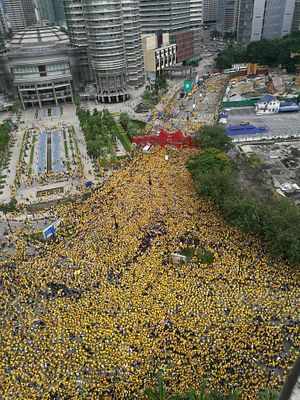The much-anticipated Bersih 5 rally in Malaysia has finally concluded in a relatively peaceful manner, despite some minor incidents in the evening of November 19 amidst a downpour. Bersih 5 is intended to pressure the government toward a new, reformed Malaysia through institutional changes to the country’s flawed governance system ahead of the 14th General Election, due by 2018. The rally highlighted five demands: clean elections, clean government, strengthened parliamentary democracy, the right to dissent, and empowerment for Sabah and Sarawak under the tagline “Satukan Tenaga – Malaysia Baru” (“Stand United – New Malaysia”).
As investigations on the 1Malaysia Development Berhad (1MDB) scandal continue, Prime Minister Najib Tun Razak’s administration has become increasingly repressive and authoritarian. While Saturday’s rally was overall considered as peaceful — due to the heavy police presence in cordoned-off Kuala Lumpur to prevent a potential clash between the Bersih yellow shirts and Red Shirts — it is not an indication that state repression has decreased.
A day before Bersih 5, there was a series of heavy-handed attempts to intimidate activists and opposition leaders. Fears of clashes between Bersih and Red Shirts were real after the latter threatened to target Bersih supporters. It was a dramatic Bersih eve, with more than a dozen from the Red Shirts and the Bersih group arrested. The pre-rally arrests had the result of causing more fear for potential protesters that intended to participate in the Bersih 5 rally the next day. Many are also angry that Bersih co-chair Maria Chin Abdullah is being held under the country’s anti-terror law, Security Offenses (Special Measures) Act 2012, which allows preemptive detention for up to 28 days.
There were also social attempts to dissuade protesters. Religious authorities told Muslims ahead of the Bersih 5 rally that staging demonstrations would invite foreign intervention and run contrary to Islamic laws. In the Friday sermon prepared for mosques nationwide, the Department of Islamic Development Malaysia (Jakim) highlighted the Islamic way of changing leaders’ faults through advice, prayers, and assisting leaders in virtuous matters.
A day after the rally, Deputy Prime Minister Ahmad Zahid Hamidi announced that more individuals would be arrested. Arguing that the law must be respected, he is reported as saying that a list of individuals involved in the Bersih 5 and Red Shirt rallies have been identified, but the names will not be disclosed.
On the rally day itself, there was a strong police presence on standby, with Federal Reserve Unit (FRU) trucks and lots of barricades. Approximately 7,000 policemen were on duty to ensure security and public order. Water cannon trucks were also deployed. Traffic at 58 roads in seven areas in the city was diverted starting at 7 am on the morning of the rally itself to keep the two rival groups from meeting. he rally organizers’ original plans to convene in Dataran Merdeka for the finale was halted by police as various barricades were erected along main roads leading to the square. Eventually, the organizers made eleventh hour plans to convene the crowd in Kuala Lumpur City Center (KLCC), and the rally was allowed to proceed as planned with no interruption from the police. Former Prime Minister Dr. Mahathir Mohamad turned up unannounced just after 2 pm in Bangsar; this marked his second time participating in a Bersih rally.
According to estimates from the police, there were about 15,000 protesters from Bersih group and 2,500 from the Red Shirts. The online portal Malaysiakini estimated that more than 40,000 protesters marched in the rally organized by Bersih. Malaysiakini estimated the number of Red Shirts who also took to the streets at around 4,000. As the protesters were not allowed to converge at meeting points before they decided to gather at KLCC later in the day, it is difficult to estimate the exact number who turned out.
However, turnout figures are no longer a direct reflection of the support received by Bersih in view of the repressive situation, which does not encourage people to come out and protest without feeling fearful. While some have suggested that political fatigue is setting in among Malaysians, dimming enthusiasm for political rallies, it is equally important to understand that Malaysia does not have an enabling environment for peaceful citizen action.
What could explain the pre-Bersih crackdown this time around is the real fear the government itself has toward citizen action. The much-predicted clash between the red and yellow shirts did not happen, due to the heavy road closures by the police. The police managed to prevent the two groups from clashing; however, in blocking off roads they also impinged on the right of protesters to march peacefully. Although the police were even-handed in their treatment of both groups, the heavy road closures were unnecessary.
While some argue that repression is hinders popular mobilization, due to the added costs associated with mobilizing, others insist that repression potentially increases grievances — which could lead to more united collective action.
This is Bersih’s fifth rally and this year marks the movement’s 10th anniversary. While many have argued Bersih has achieved little in demanding the government make meaningful reforms, one interesting trend that has emerged is that how state repression influences Malaysians’ ability to challenge the government. Although state repression limits protests, over time it has also facilitated the continuing growth of civil society in the country, which then led to the crippling of the government’s political legitimacy.
Najib argued that it is unlawful for any party to try to unseat a democratically elected government via street protests, saying that the people should wait until the next election to choose their government via ballot box. But the crucial issue remains: toppling a democratically elected government and reforming the election process are interlinked issues.
Dr. Khoo Ying Hooi is Senior Lecturer at the Department of International and Strategic Studies, Faculty of Arts and Social Sciences, University of Malaya.
































